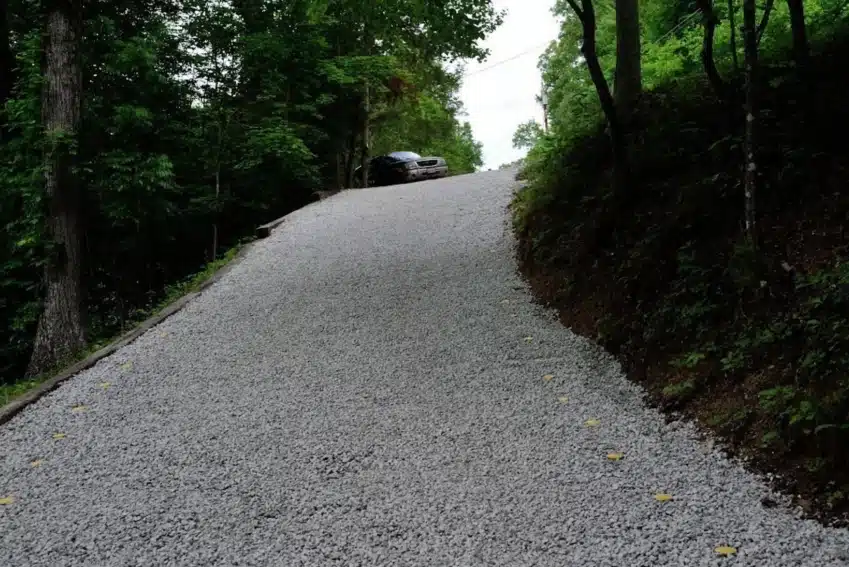Comprehensive Range of Services

What is the Best Paving Material for a Steep Driveway?
Driveways can be tough to manage. Depending on what type of driveway you have, how it’s shaped, where it’s located, and what it’s made out of, you might have to invest a significant amount of time and energy into maintaining your driveway.
Driveways on a steep slope, for instance, come with their own unique set of problems and challenges. Steeply sloped driveways are sometimes unavoidable, or even desirable, despite the problems they can present.
In case you’re looking to build or renovate a driveway on a steep slope, let’s take a look at some of the best steep driveway options out there and see how they stack up against each other.
What Makes Steeply Sloped Driveways Unique?
Steep driveway surfaces are known for being much harder to manage than regular driveways. This is mostly due to erosion and the shifting of the subsurface beneath the driveway’s surface.
For starters, stormwater tends to cascade down a steep driveway, running along the sides of it and creating deep crevices through the process of erosion. These crevices can be dangerous if you accidentally step into them or drive into them. They can lead to ankle injuries, as well as suspension and axle damage to your vehicle.
Shifting of the entire driveway or even collapse in certain areas is also possible if erosion reaches all the way underneath your steep driveway. This is most common with materials like asphalt and concrete, which tend to be laid in solid pieces over the surface of the soil. They are not typically anchored to the subsurface in any way, which leaves them especially vulnerable to shifting and erosion on a slope.
Damage, or wear and tear, to the surface of materials like asphalt and concrete can also lead to water intrusion and subsurface damage to your driveway, made all the worse by its location on a slope.
The effect that gravity has on the water once it reaches the subsurface of your driveway exacerbates the effects of normal erosion, leading to a driveway that can become completely compromised in a fraction of the time a level driveway would have.
This makes the need for resealing more frequent, costing you more. It also may require you to install some sort of drainage or protection on the sides of your driveway as well.

What Material is Best for a Steep Driveway?
The best material for steep driveway installation is permeable pavement. This can refer to a number of steep driveway ideas such as brick, concrete, or rubber pavers, but recycled plastic pavers perform best in all of the most important categories that a steep driveway needs them to.
Permeable pavers allow water to drain directly through them, thus preventing subsurface washouts and erosion along the sides of a driveway. Brick and concrete pavers are not ideal here, though, since they are not as durable and do not handle ice or snow very well.
Permeable plastic pavers like the kind made by TRUEGRID are the superior option for creating the best driveway for a slope. They are 98% permeable, durable enough to last 60 years with minimal maintenance, and can deal with ice and snow effectively.
TRUEGRID PRO PLUS, combined with staking, is an effective way of preventing erosion. PRO PLUS is typically laid over a dense-graded gravel base layer of at least 6 inches in depth. Contact the manufacturer for staking and installation instructions for sloped driveways.
Once snapped into place, the empty pavers on the surface are filled with more gravel and driven over to press the gravel into the pavers. This weighs them down and prevents them from moving, even under heavy vehicle traffic.
The water that normally wreaks havoc on a sloped asphalt or concrete driveway simply drains directly through the gravel subsurface and into the soil below, making TRUEGRID pavers the best surface for sloping driveway problems. They’re also made from 100% recycled plastic, making them one of the most eco-friendly paving options on the market.
Build a Safe Steep Driveway With TRUEGRID Pavers
If you’re wondering what is the best material for a steep driveway, TRUEGRID permeable plastic pavers are the answer. They are uniquely suited to mitigate all the problems that normal steep asphalt and concrete driveways face and are far more durable.
Resistant to UV rays as well as temperature fluctuations, these pavers are truly all-weather, all-terrain, and effective for use just about anywhere in the world. If you need to build a steep driveway and are looking to avoid erosion, flooding, costly maintenance, and durability concerns contact a pavement professional at TRUEGRID today for a quote.
